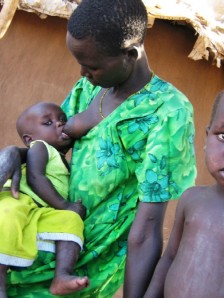
Volume 1, Issue 1 / December 2008
Kakuma Refugee Camp hosts thousands of refugees from various nationalities who fled their home countries because of violence, war, or insecurity. Refugees came to seek refuge in Kenya in search for peace and security, to find a place free from threats and violence. Kakuma Refugee Camp has proven to offer some level of peace and security, but it is not satisfactory.
Many agencies provide services to help fight and prevent violence here in Kakuma Refugee Camp. The Peace Building Unit of Lutheran World Federation (LWF), for example, helps to resolve conflict between refugees, while the Child Unit of LWF helps to prevent child violence. The Gender Unit of LWF does a similar job, but focuses on fighting and preventing sexual and gender-based violence (known as SGBV). Agencies like LWF, the International Rescue Committee (IRC), Jesuit Refugee Services (JRS), and the National Council of Churches of Kenya (NCCK), play a significant role in promoting peace and security in the camp by providing training on issues such as human rights, peace, and security. These efforts by NGOs have made it possible for refugees to taste a state of peace and security.
Unfortunately, these efforts have not proven to be sufficient. There remain many cases of violence committed upon children, women, and refugees in general. One reason for this may be the fact that most refugees experienced or witnessed various kinds of violence in their home country. As a result, they may tend to behave violently. In the last month, for example, a Somali man was stabbed in the stomach by a Somali woman. This incident happened after they had argued over the length at which the man’s fence should extend into the woman’s compound. Another example of such behavior can be seen during shows on Premier League games. Afterwards, young men may fight over as small an issue as being harassed unexpectedly. Refugees tending to behave in this way create an environment that is prone to violence and insecurity.
A general sense of insecurity arises from thieves in the local and refugee communities who steal, beat, break into refugee homes, and sometimes kill. Having witnessed people killed by bandits, many refugees return to their houses early and avoid walking at night to prevent being surprised by thieves. Compound fencing made of strong tree branches is commonly used to prevent trespassing.
In such conditions, refugees cannot live or work happily. To live in peace and security, everyone needs to be free from violence and feel safe and protected against threats. Life in Kakuma Refugee Camp is not truly secure because refugees live constantly with worries of thieving and violence.
Two Cases of Insecurity
From Kakuma One to Kakuma Four, it is almost impossible to spend a month without hearing of a new insecurity case. Although most of these cases are recorded and kept in various units within LWF, I managed to talk to two refugee victims of insecurity who were willing to be interviewed for KANERE.
Elizabeth lives in the Equatorial Community, and is a 28-year old mother of four children. In July of this year, the Kenyan police forces clashed with refugees in Kakuma One. While she was rocking and singing to her baby child, a stray bullet happened to pierce her left arm. She did not feel or notice anything. Her neighbors were first to notice the bleeding and asked her what was wrong. Only then did ElizabethMain Hospital for treatment. After six days, Elizabeth was discharged with her left arm still swollen from the wound. notice her own bleeding and was rushed to the
Although her bullet wound has since healed, Elizabeth continues to feel pain in her arm. She says this pain prevents her from doing daily work and carrying heavy loads. As a result, she feels very limited. Being a mother of four, she wants to give all that she has to her family, but the bullet wound has prevented her in fulfilling this goal completely.
Mesfin Getachun is a 35-year old Ethiopian man living in Kakuma camp. He owns a shop in the Ethiopian Market and was attacked by an unknown group of armed bandits in March of this year. Around 2:00 a.m., bandits managed to penetrate the well-fenced perimeter of the Ethiopian Market and break the heavy chain lock on the front door of his shop. Neighbors startled by the noise began screaming, and the bandits reacted by shooting. This sparked immediate panic and silence ensued for a short time. After a pause, the bandits entered Mesfin’s store and took an unspecified amount of money, mobile phone scratch cards, and other goods. After finishing, the bandits began to exit the community area, shooting into the air as they went. They encountered a small group of people and shot at them, while shooting at any doorway where they suspected people may be trying to escape. Several people were wounded by bullets in the fray.
Fortunately, Mesfin was not sleeping in his house that night. He reports that it is only by God’s mercy that he was not present in his house during the robbery. Since the incident, Mesfin no longer lives peacefully and continually remembers all that he went through.
These are only two examples among many cases of insecurity in Kakuma camp. Like Elizabeth, some victims of insecurity experience permanent changes in their life due to violence. Today, Elizabeth cannot give all her energy and strength to her lovely family. For Mesfin, he cannot forget the hand of the mighty God who provided for him that fateful night. Elizabeth, Mesfin, and other victims of insecurity undergo unique experiences that change their ability, attitudes, faith, thoughts, and perspectives on life.
